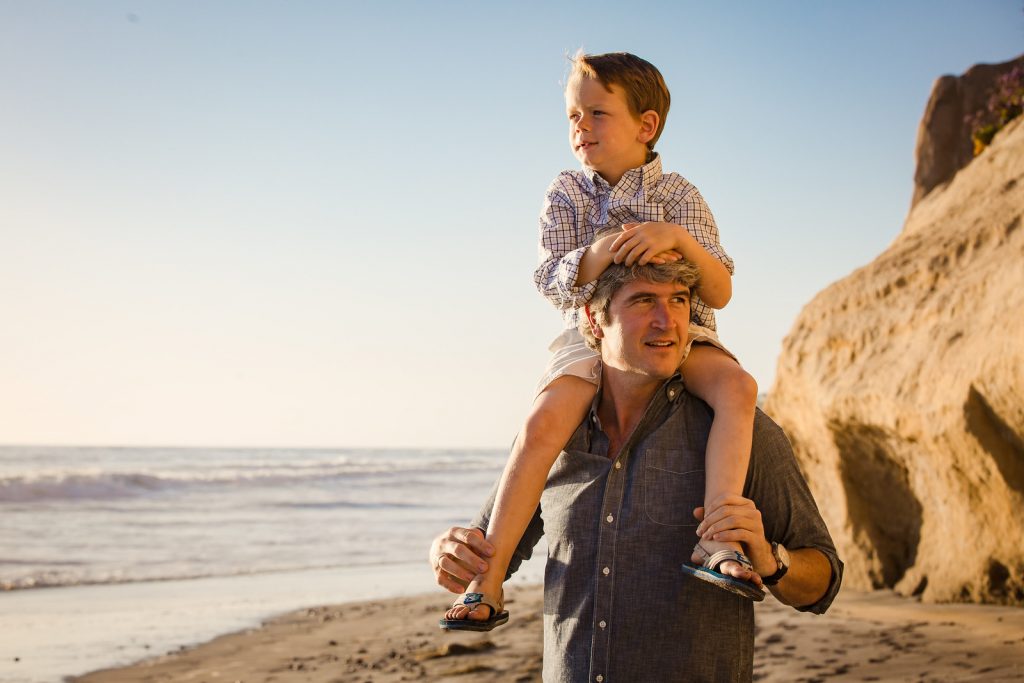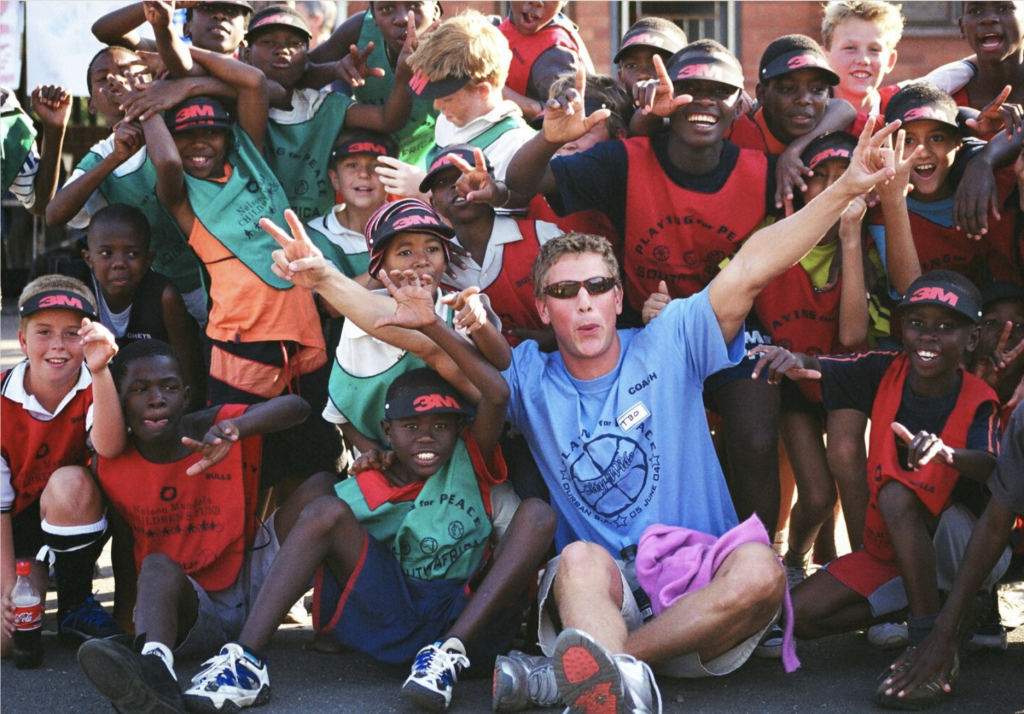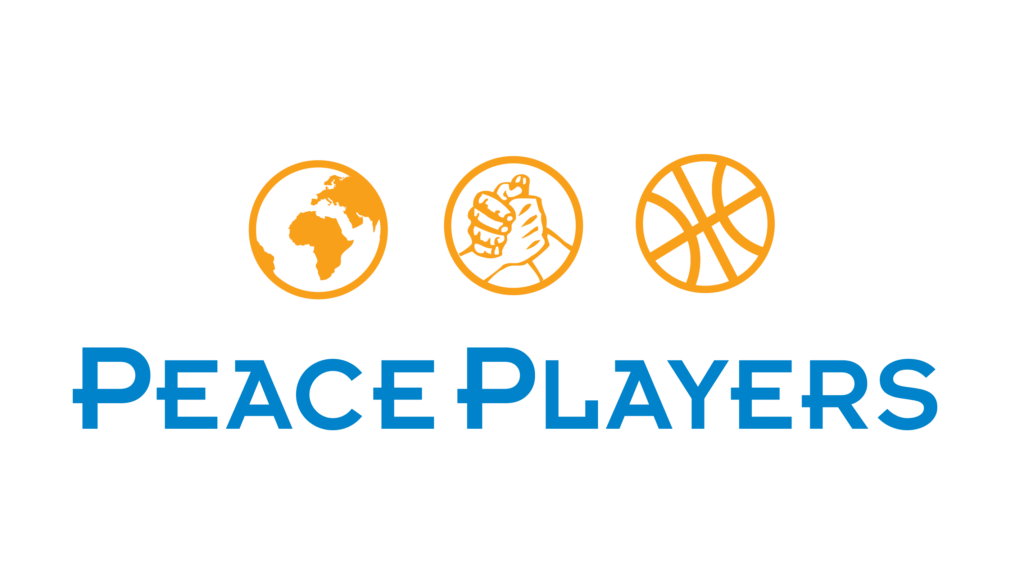Exploring PeacePlayers Origins
A Q+A with Sean tuohey & thibault manekin
Part 1 & Part 2
July 20, 2021
SHARE
For the inaugural month of PeacePlayers’ 20th anniversary, we thought we’d get the straight story about how our global movement got started. PeacePlayers’ Play It Forward Podcast host Chinny Nwagbo and co-host Emmet Shephard sat down with founder Sean Tuohey and co-creator Thibault Manekin, who 20 years ago ran with a seemingly wild idea, a whim, to quote Sean himself, to use basketball to try to tackle some of the greatest challenges facing countries around the globe.
Sean got the idea to start PeacePlayers after coaching cross-community basketball in Northern Ireland. He recognized the unique role sport could play in bringing people together across societal divides. While in Belfast, Sean befriended a police chief who suggested that what worked in Northern Ireland could also help in post-apartheid South Africa. With seed money raised from family and friends, Sean and his brother Brendan launched PeacePlayers (then Playing for Peace) in 2001.
Meet Sean:
Sean Tuohey is the co-founder of PeacePlayers, and most recently the founder of Intellectual Athlete, a new initiative that fuses sports, play and mindfulness to elevate youth. A D.C native, Sean now lives in Solana Beach, California.
I started at PeacePlayers sort of on a whim, with the idea that kids who play basketball together could become friends and really, really smart, cool people got involved and built it into an amazing organization.

Meet Thibault:
A Baltimore native, Thibault Manekin is the co-founder of Seawall Development and Co-Creator of PeacePlayers. He is now leading an initiative called “Larger than Yourself.”
Sean convinced me to go on this wild ride and adventure and meet him in South Africa at the beginning of the PeacePlayers program, and we were literally just driven forward by the opportunity to change the way that people relate to each other through sports, and it's been so inspiring to watch the organization grow.

Emmett: How did you get the idea to start something like PeacePlayers, and then how did you end up making that idea just come to fruition?
Sean: Well, I'll start with the idea itself. I remember, I was coaching a session in Twinbrook in Northern Ireland. This is the year before PeacePlayers officially started, but I was coaching in Ireland and got a lot of Catholics and Protestants playing together. But while I was coaching the session, it dawned on me that I had carved out a pretty awesome job. I was living in Ireland, being paid to coach kids, and I knew right then that other Americans would love to have this job - like-minded people who want to travel and do something cool after graduation. So that was sort of the start of me just thinking like this is worth more investigation and developing, and then came back to America, with the idea of you know, doing this in a different place, South Africa, and after it got going there, we really needed to turn this into the organization, and that's when I recruited Thibault to kind of help build the thing into an actual business where it had some structure to it.
Thibault: Yeah you know, for me, it was a dream. I grew up playing sports my entire life, and when I sat down for lunch with Sean that day in Baltimore, you know, he spent three hours telling me these amazing stories of sports bringing kids together from all over the world and there's this Aha moment that, of course, like... all my best friends are guys and girls I grew up playing sports with, and of course this works all over the world, and of course it's worked for hundreds and thousands of years, the power of sports to unite.
And you know we showed up to South Africa, and it was amazing. You know, you dribble a basketball through the township of Umlazi, and there'd be like hundreds of kids behind you, just like going wherever that ball was going, and same thing in the in the white suburbs and the Indian townships and the coloured [official South African term for people of multiracial heritage] townships, and immediately you saw the power of sports to bring people together wasn't unique to how we grew up here in the States. And you know, even more so in a country like South Africa, where they didn't have the balls and the infrastructure.
Chinny: Why sports? Why sports in conflicted areas? Why sports when we talk about bringing people together? Why did you guys choose sports basketball in particular?
Sean: I wouldn't use the word sports. I would use this word specific to basketball, because after we came back, you know, our third or fourth year, we were throwing the idea of kind of getting lacrosse going, in a similar model here in the States. And Thibault, he grew up playing Lacrosse and he's like, “Look, it's different. You're wearing a mask, there's a barrier.” And basketball... One, basketball works, specifically in Ireland, in Africa, because it was a game without a history. In South Africa, blacks play soccer, whites play rugby, Indians play cricket. In Northern Ireland, the Catholics played Gaelic games and Protestants play rugby and cricket. They both play soccer, but the teams are so steeped in hatred, they don't play each other. So, to thosetwo specific countries where we started, basketball was uniquely ideal, especially because it was seen as an American export. And, it's so cheap to play. You only need a ball to get better. Once we put some hoops up in South Africa, that did all the work for us. I don’t know if a lot of other sports have that. You know, the field sports don't have that sort of rim and, and the idea of this thing ten feet tall that everyone in the township comes and sees
Thibault: You know, it was such a new sport, especially in South Africa, and there was no racial identity to it, and there was such a low barrier of entry and the perfect sport and probably the only sport that would work at the time.
Sean: Another thing I'll say is, Thibault brought a lot of optimism. I don't think I’ve had as much wins in my life, as I did during those 18 to 24 months when Thibault first got down. It seemed like everything that we wanted to do, succeeded. We’d throw an event in the townships, it worked. It was huge. We’d throw City-Wide Tournaments --it was the biggest thing anyone's ever seen. So, it just seemed like we were batting 1,000 down there. Like, whatever we wanted would happen, and it would be so much fun. It was just a lot of fun.
Emmett: If you were batting 1,000, were there any challenges that you faced, or did you have any fears starting something like this and what were they?
Sean: I’ll go back to the City-Wides. I would come back giving high fives from the City-Wide, which had 1,000 kids. And Thibault would be sitting there, like “That wasn't a good tournament.” So I think the accountability that we put on ourselves was you know, there was more sort of infighting on that level, like we wanted this thing to be excellent, and we called each other out on a lot, because if it didn't pass mustard with Thibault, it wasn't good. So we kept each other accountable in that regard.
Thibault: Yeah, we had enormous wins, and I agree at the end of the day we batted 1,000 and we messed up and failed every day, too. And the things that we were failing at, we had no idea. At our first tournament, thousands of kids from all over Durban showed up on a makeshift park with makeshift hoops. And for a lot of these kids it’s their first time to the city and the park is a quarter of a mile from the beach. You gotta cross three enormous roads to get there and then you're at the beach. Within the first 30 minutes of the first whistle going off in the game, a quarter of the kids sprinted to the beach. And I've got visions of Sean grabbing kids holding them up, us chasing them across fields trying to rein them in and make sure that they knew that they were there for a game of basketball. Not a day at the beach. I remember, we were building basketball courts out in the township, and this was like piecing together subcontractors throughout the country or throughout the area of Durban, and we'd have these court launches from the company that would sponsor the court. And the contractor had months to build the court. And I remember this one, he had only put the asphalt down on half the court, and the court launch was the next day, with all the dignitaries and the tribal leaders and everything coming. And Sean and I went to his house, the contractor’s, at like 9:30 at night. It was pitch black. And we're like ‘Hey, failure is not an option. We have kids counting on us, and community counting on us.” And we pulled him out of bed, we got his truck we drove him to the court. And under this like hot orange full moon rising over the township, we lit fires to heat up the asphalt, and the coaches came and we finished the job. We got in at like three or four in the morning. And nobody would have known that that happened but, we were again like, failure wasn't an option. We batted at 1,000, but it was because we were incapable of giving up, we were incapable of settling for just status quo.
Part 2
Chinny: Was there an “aha” moment where you guys were like, “Okay, this is working, we’re on the right track, let’s stick with it.” Was there a specific moment where you’re like “We are exactly where we’re supposed to be; let’s keep going”?
Thibault: Yeah, there were so many of those moments. For me, it was the day that we brought 40 little white kids from Clifton Primary School in Morningside out to the township of Umlazi, and we had gone to meet with the school. We had told them about the program. And they were really hesitant, this was a big ask. We got the national media - South African broadcasting agreed to come out on the bus. There was going to be security. We did everything we could to make that school comfortable going out to the township. Meanwhile, when you're out in the township at a primary school, you showed up and you went to meet with the principal and we were like, “Hey, can we bring our friends from Clifton out?” and [he] didn't even flinch, like “What day are they coming? We can't wait to have them as our guests.” I rode out on the bus with 40 little white kids and it was your typical bus ride out like kids are chattering. And the second you cross into the township of Umlazi, you know that it’s different, and it was dead silence. We pulled into the parking lot there, a dirt parking lot. And there was about 500 kids from the school and community members outside. You could hear this deafening sound, and all 500 kids and committee members were singing the Shosholoza, which was kind of the illegal national anthem from when Mandela was released. And the like 40 little scared white kids made their way down like through this parting of the seas and made their way to the court. And, quickly, the coaches took kids from both teams and tried to get everybody to feel comfortable and they weren't, and we went through the first half of the game, and like there was just fear on both sides, right? And meanwhile the crowd is like ten deep surrounding this court that we just built. And at halftime, the coaches came to me, and they said, “Hey, this isn't working. This is defeating the purpose of the day. We have to mix the teams.” Which is a brilliant idea. Like, how did we miss that to begin with? And so we mix the teams, and from that moment on, like almost nothing mattered. It wasn't about keeping score anymore. And these kids had the most amazing second half of the game. The crowd on the sidelines erupted in the Shosholoza again. I'm standing at the top of the hill, taking it all in. Most of the coaches had tears in their eyes. This is something that most people told them was impossible. You know, they had lived through the brutal Apartheid system and here they were, on the other end of it not only like witnessing it, but like creating it and making it happen. For me, that was the tipping point where we're like, “Yeah, we're on our way.”
Chinny: Sean, any ‘Aha’ moments for you?
Sean: I would fast forward a couple of years, so to Israel and Palestine. Our first twinning was [in Jerusalem] with an Arab group and a Jewish group. It was our first time we're gonna bring together and we did that at a Jewish college that's right on the border of these two communities, and it was Kiryat Gat and Esawiah. And the College students heard that the Arab kids were coming in their school and they blocked the gates. Someone threw this flaming newspaper over the fence at these kids, like it was significant. You can tell like this was a serious thing. And so we're back at the vans like, and the Arab and the Jewish coaches were like “We're doing this. We're definitely going and having this practice.” And Matt Minoff, who was running the show, he had organized the whole thing, and so we were led in by the Arab and the Jewish coach to do this first twinning, because they wanted to see it happen, because you know, we're going to set everything back 20 years if we don't do this. So the students had to be cleared out of the way, and we get into the gym. And so, at that point, I was like “Okay, this can work in a live, hot hot zone, so that led me to believe that this thing is going to continue to grow.
Emmett: What about PeacePlayers separates from other organizations in the world that are using sport to try to enact positive change, like what makes PeacePlayers different?
Sean: I think that we were one of the first. Sport for development was kind of a new term. I knew one other organization doing this. It wasn't a thing, using sport for other things, so I think we got it out of the gates, three or four years ahead of everyone else who's doing lacrosse to teach grit or you know volleyball to teach... I mean there's all these things where people are laying other things on top of sport. And I think we got out of the gates first, and we got really good people. We were lucky to have such a cool network. I mean, Thibault brought in five or ten people who are now doing incredible things. I was able to bring in a bunch of people, and so we had very cool networks. I think we got really good people who are just generally flypaper, for you know, efficiency.
Thibault: What I think we did really well is, we listened. You know, we were very clear from the beginning that this wasn't our idea. Like, sports had been used for centuries to unite people, and you know we showed up very humble and we weren't showing up as two white Americans either, with this idea of, “Look, we have the answer to solve South Africa or Northern Ireland’s problems,” and I think that, humility allowed us to kind of be quietly behind the scenes, you know, making good noise. But really, saying, “This is going to be your program, and how can you shape this program in a way that's going to work for the country?” Because we were able to listen, because we were able to adapt on the fly and really understand the hot button issues in each of the places we went, and empower the local communities to understand that this was theirs, not ours. And our opportunity for success was to really help everybody else shine, and it’s that ability to listen deeply is I think what made PeacePlayers as strong as it is.
Chinny: Tell me how you feel from where you started to where we are now 20 years later. What are your thoughts?
Sean: So, I'm still on the journey. I'm trying to find the highest and best use of a coach on the therapeutic route. I'm basically trying to teach kids how to manage their anxiety and stress through a fun play practice framework. And a lot of the tools that I learned was in South Africa, there are so many issues with kids and there's so many things that they need. We can give them that one thing, through this funplay practice framework. So, I'm still throwing punches, and Thibault is on a much higher, different way, building communities. So I think that I'm still running full speed, so is PeacePlayers, so is Thibault. And there's so much work to be done, that it's hard to kind of sit back and give ourselves all these high fives. Because we're still in the trenches.
Chinny: Absolutely. Thibault, how would you describe the journey from then until now?
Thibault: Look, I've lived an incredibly blessed life, been a part of some amazing things and have grown as a man, and as a leader, as a father, but like, I’m actually quite sad, you know, and Sean I don't know if you feel this way, but you know we've all been a part of some amazing things since leaving PeacePlayers, but it was the greatest thing that I’ve ever been a part of. And when I look at all of the heroes that were there and left to go on and do amazing things and [I think], what was it and, why isn't it that we all didn't stay forever. But, in that moment, we were a part of building one of the most important organizations our planet’s ever seen, and there are no answers on how to do it, but I wish I was more present in that moment to realize the opportunity of living in these different countries and taking on incredible challenges where failure wasn't an option. And really beginning to move the needle and understanding where we were falling short. And like there isn't a day that goes by where I don't tell some PeacePlayers story or don't think about some experience that I've had and wish that I could go back there, so I guess my message for the folks out there, in the countries and doing the work, just cherish this time and moment and get out of your comfort zones and push the limits. And I know the organization is much more structured than it was when Sean and I were there. We didn't have the infrastructure in place and we were allowed to run more freely, but don't let that stop creativity and continuing to push this in the direction that it needs to keep going in.
Sean: That's a great answer, and I’ll also say that I think that Thibault’s and my spirit were kind of called to get this thing off the ground. And it ragdolled us, like we experienced loneliness like a whole different spectrum of just living out of a backpack in a strange place. And we were always coming home for like one or two months at different times, when all of our friends are in their early 20s getting married and doing things. And, I think Thibault’s exactly right in the fact that we loved the moments that were so much fun, but we didn't understand how great of an experience it was at the time. I think we spent a lot of time sort of in our own heads, feeling sorry for ourselves that we weren’t in the natural track and I think that if I could go back and shake that kid and let him know how great this is and how to enjoy every moment as Thibault said. We didn't know how the world doesn't act like that, like the world’s a real place where you got to get up and just grind away, whereas there was this magical place filled with w's and friendships and fun and yeah, I just look back on it, with so much gratitude.
Thibault: I want to chime in too that Sean and I were in the trenches doing really hard work and, tensions and egos were like flying all over the place, and we were still able to get amazing things done. It takes courage to go someplace with no roadmap and nothing but a couple bucks in your pocket and a basketball and show up to the places like Sean did. Like, my job, and all of you guys's jobs who are listening here were made easy because somebody took that first step, and I'll never be able to thank Sean for bringing me along for the ride early on. I’ve seen this guy in hectic situations and I don't think like fear exists in it, I don't think it's a word he knows and because of that, the program’s worked in 22 countries, tens of thousands of kids, thousands of coaches and volunteers, and we we've got Sean to thank for starting down that journey.





